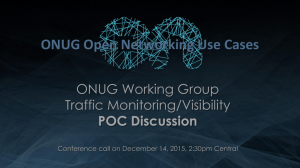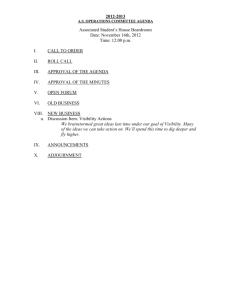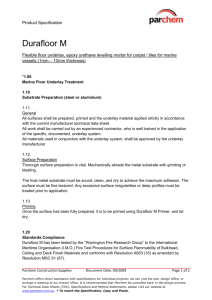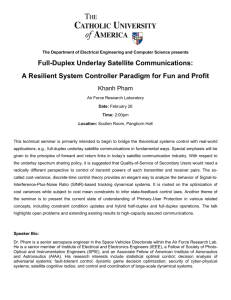December 14, 2015 - Open Networking User Group
advertisement
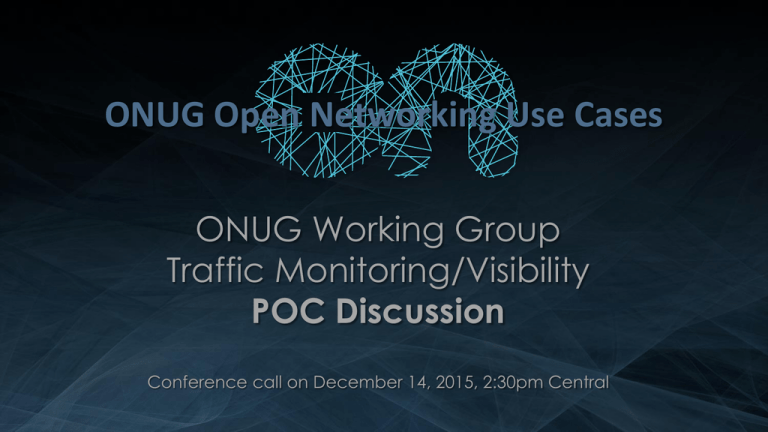
ONUG Open Networking Use Cases ONUG Working Group Traffic Monitoring/Visibility POC Discussion Conference call on December 14, 2015, 2:30pm Central Today Discussion • Introduction – Again – Who is New • Refresh Memory • Where we are.. Test Plan • Goal for this third round • Understanding what we want to see on the vendor POC. Can we select the most important requirement for the vendor to work with • Combining the requirement with the Network Management Stack • Meeting Format: • • First two month, Enterprise user only to define the Goal. Vendor Involvement Attendee Today Todd Simmer, Enso Travis Griffin, FedEx Tentative Bob Natale, MITRE Tentative Steve Lafrentz, Principal Financial Group Sean Wang, University of British Columbia Fred Lima, Visa Jem Pagan, JNK Securities Brian Ong, Navy Federal Credit Union Timeline Event / Milestone Kickoff Conference Call Date December 14, 2015 2:30pm CT Conference Call (Enterprise) January ?, 2015 2:30pm CT Conference Call (Enterprise) February 8, 2015 2:30pm CT ONUG Spring 2016, West Coast May 2017 Refresh Memory -- Traffic Monitoring/Visibility • Problem Being Solved: Over & Underlay Traffic Filtering/Steering – Allows for highly customizable data capture and copy based on header and DPI matches – Automated/flexible traffic steering capabilities to monitoring tools – Limited SPAN/monitor port capacity on network switches – Polling schemes don’t scale – Lack of network traffic/flow visibility usage trends – Lack of scale: need visibility into 1,000s of flows • Open Networking Components: – Open API and Controllers + SDN Tap application provides SPAN functionality on arbitrarily large number of switch ports + SFLOW – White box networks to aggregate SPAN ports • Gap: Shadow network. Can’t monitor without big data network analytics, information visibility. – Service Node Monitor Ports filters filters Multiplexer Delivery Providing all information about network infrastructure plant • Benefits: Over & Underlay Traffic Monitoring, Steering – Business unit self service – CapEx/OpEx relief – Network/traffic/flow visibility Tap Applicatio n Service Node User Tooling Desired Architecture Top 10 Requirements 1. Commodity hardware based upon merchant silicon with either an open or propriety Switch OS. 2. Granular filtering based on 5-Tuple and/or even more., including Application signatures, and QoS marking capability. 3. Capability to work with both underlay and overlay protocols, providing independent filtering on either, and/or correlate both traffic. 4. Process data without impact to production flow/processing flow (CPU/Memory/Bandwidth). 5. Horizontal scalability with the capability of resource management feedback. 6. Must be able to locally process data and create traffic signaling/alerting, while executing defined traffic based actions. 7. Interoperability between vendors: integration and output that will support data collection integration. Open API for access and management (in/out). 8. Capability of Packet De-duplication/Packet Slicing/Data Masking and Application Recognition, including Packet Organization. 9. Must be Security and Compliance aware. 10. Multilayer visibility between underlay and overlay protocol use for management/SLA, monitoring/alerting, troubleshooting and reporting capabilities. Recap on the Prioritization of the Requirement • • Granular filtering based on 5-tuple and/or even more, including application signatures, and Quality of Service (QoS) marking capability. Capability to work with both underlay and overlay protocols, providing independent filtering on either, and/or correlate both traffic. • • • Capability of Packet De-duplication/Packet Slicing/Data Masking and Application Recognition, including Packet Organization. The ability to be Security and Compliance-aware. Multilayer visibility between underlay and overlay protocol use for management/Service-Level Agreement (SLA), monitoring/alerting,troubleshooting and reporting capabilities. Validation Test Setup Inter-relationships of ONUG Management Working Groups ONUG Service Lifecycle Management Automation Framework IT Service Lifecycle
